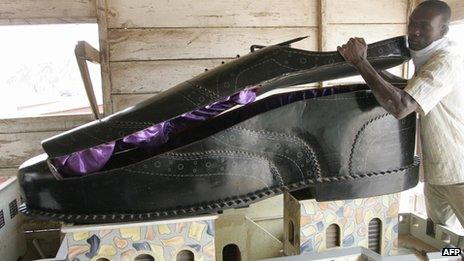African viewpoint: A three-day week for Ghana?
- Published
- comments

In our series of viewpoints from African journalists, Ghanaian Elizabeth Ohene considers whether Ghanaians, like Gambians, should be given longer weekends - to attend funerals.
By now almost everybody has heard about the latest edict from His Excellency, The President, Sheikh, Professor, Dr, Alhaji Yahya Jammeh, the ruler of The Gambia.
He has decreed that the public sector should embark on a four-day week work regimen, with schools the exception.
According to him, a shorter working week will allow Gambians to devote more time to prayers, social activities and agriculture.
Government employees will still work a 40-hour week, made up of four 10-hour working days starting at 0800 and ending at 1800.
I have been wondering if this was something we could adopt in Ghana.
The truth is that over here, public sector workers have always found ways to have four-day weeks if they want.
It is not official but many people end up doing four-day weeks.
I probably need to point out that we in Ghana take funerals seriously and these are time-consuming ceremonies.
Most of us spend weekends attending funerals around various parts of the country; that is how internal tourism works here.
Funerals are not one-day events.
Unwritten rule
I shall not get into all the rituals and arrangements that have to be done from the moment of death.
Nor am I talking about keeping bodies in mortuaries for months on end.

Funerals in Ghana, famous for their bespoke coffins, are an all-weekend affair
I refer only to the time that has been agreed for the burial and funeral rites.
In many parts of the country, Fridays tend to be the days when bodies are taken home from the mortuary to be laid in state.
This is not something that can be done during the lunch-hour break.
If you have a funeral to attend, you need to have Friday off and you are deemed to have a funeral when the dead person is a parent, a sibling, a child, a spouse or partner, an in-law, a grand-parent, a cousin, an aunt, an uncle, a friend, a classmate, a nephew, a niece, a boss, someone you go to church with, a workmate, a neighbour and of course, a president.
In other words, you are likely to have a funeral every weekend.
Even though Fridays are official working days, we have all learnt to accept that if we have any business with anybody in the public sector it is not a good idea to try to go to the office on a Friday.
The unwritten rule is that business is conducted in the public sector from Monday to Thursday.
On Saturdays, we have services and bury the dead and have funeral rites and on Sundays we have thanksgiving services.
So, would it be a good idea to simply declare Fridays non-working days?
'Thank god it's Thursday'
I can think of a really smart way of packaging the announcement to make it sound like we are the business-like people that we indeed are.

Tens of thousands of people attended the funeral of Ghana's President John Atta Mills last year
It would go something like this: As part of innovative efforts to brand Ghana and make us a leading funeral tourist destination, Fridays will be spent organising funerals.
But something tells me if Fridays are sanctioned officially as non-working days in Ghana, Thursdays will become the new Fridays.
We shall thank God it is Thursday instead of thanking God it is Friday.
The impossible traffic in town will move from Fridays to Thursdays and we will spend endless hours stuck in traffic on the roads and officialdom will find reasons to make Thursday afternoons inconvenient for meetings.
I have this horrible feeling that the weekends will end up as stressful as the working days.
Then there is the other little problem of Ghana not having the equivalent of anybody who can simply decree that we change from a five to a four-day working week for whatever reason.
If you would like to comment on Elizabeth Ohene's column, please do so below.